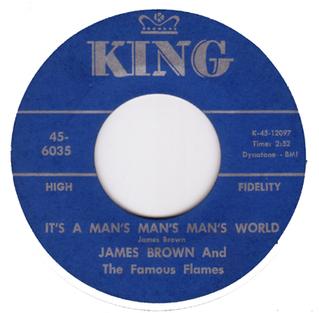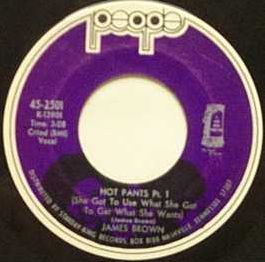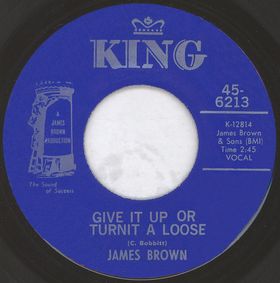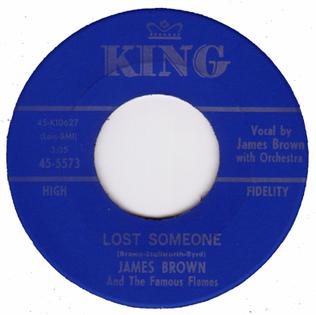Related Research Articles

"Funky Drummer" is a single released by James Brown in 1970. Its drum break, improvised by Clyde Stubblefield, is one of the most frequently sampled music recordings.

"I Got You (I Feel Good)" is a song by American singer James Brown. First recorded for the album Out of Sight and then released in an alternate take as a single in 1965, it was his highest-charting song and is arguably his best-known recording.

This is a discography chronicling the musical career of James Brown. Brown joined Bobby Byrd's vocal group The Flames in 1953, first as a drummer, and then as leading front man. Later becoming The Famous Flames, they signed with Federal Records in 1956 and recorded their first hit single, "Please, Please, Please", which sold over a million copies.
"Soul Power" is a song by James Brown. Brown recorded it with the original J.B.'s and it was released as a three-part single in 1971. Like "Get Up Sex Machine" and other hits from this period it features backing vocals by Bobby Byrd. It charted #3 R&B and #29 Pop.
"There Was a Time" is a song written and performed by James Brown.

"It's a Man's Man's Man's World" is a song written by James Brown and Betty Jean Newsome. Brown recorded it on February 16, 1966, in a New York City studio and released it as a single later that year. It reached No. 1 on the Billboard R&B chart and No. 8 on the Billboard Hot 100. Its title is a word play on the 1963 comedy film It's a Mad, Mad, Mad, Mad World.

"Hot Pants (She Got to Use What She Got to Get What She Wants)" is a funk song by James Brown. Brown recorded the song in 1971 and released it that year as a three-part single on his People Records label, which was then distributed by his primary label King. It was a number-one R&B hit and reached number fifteen on the Billboard Hot 100 pop chart in the U.S. along with reaching number ten on the Cashbox magazine charts. "Hot Pants" was Brown's final release under King's purview before he (and the People label) moved to Polydor Records. The song's lyrics are an ode to the captivating power of the title garment, which members of the band first saw on their 1970 European tour.

"Give It Up or Turnit a Loose" is a funk song recorded by James Brown. Released as a single in 1969, the song was a #1 R&B hit and also made the top 20 pop singles chart. "Give It Up or Turnit a Loose" appeared as an instrumental on the Ain't It Funky (1970) album, removing Brown's vocals and adding guitar overdubs, while the vocal version was released on It's a New Day – Let a Man Come In (1970).

"Lost Someone" is a song recorded by James Brown in 1961. It was written by Brown and Famous Flames members Bobby Byrd and Baby Lloyd Stallworth. Like "Please, Please, Please" before it, the song's lyrics combine a lament for lost love with a plea for forgiveness. The single was a #2 R&B hit and reached #48 on the pop chart. According to Brown, "Lost Someone" is based on the chord changes of the Conway Twitty song "It's Only Make Believe". Although Brown's vocal group, The Famous Flames did not actually sing on this tune, two of them, Bobby Byrd, and "Baby Lloyd " Stallworth, co-wrote it with Brown, and Byrd plays organ on the record, making it, in effect, a James Brown/Famous Flames recording.

"Out of Sight" is a funk song recorded by James Brown in 1964. A twelve-bar blues written by Brown under the pseudonym "Ted Wright", the stuttering, staccato dance rhythms and blasting horn section riffs of its instrumental arrangement were an important evolutionary step in the development of funk music.
"Talkin' Loud and Sayin' Nothing" is a funk song written by James Brown and Bobby Byrd. Recorded in 1970 by Brown and the original J.B.'s with Byrd on backing vocals and updated with a new melody, it was twice released as a two-part single in 1972. It also appeared on the album There It Is.
"Oh Baby Don't You Weep" is a song recorded in 1964 by James Brown and The Famous Flames. Based upon the spiritual "Mary Don't You Weep", it was recorded as an extended-length track and released as the first two-part single of Brown's recording career. It peaked at #23 on the Billboard Hot 100 and at #4 on the Cash Box R&B Chart.. It was the last original song featuring the Famous Flames to chart, not counting the 1964 re-release of "Please, Please, Please" and the 1966 B-side release of the Live at the Apollo performance of "I'll Go Crazy".
"Let Yourself Go" is a 1967 song by James Brown.
"Hey America" is a Christmas song recorded by James Brown. It appeared on his 1970 Christmas album of the same name. It was released as a single that failed to chart in the United States, but reached #47 on the UK Singles Chart in 1971.
"Baby You're Right" is a song by Joe Tex. He recorded it for Anna Records in 1961. Tex re-recorded "Baby You're Right" for Checker Records in 1965.
"Ain't That a Groove" is a song written by James Brown and Nat Jones. Brown recorded it in 1965 with the female vocal group The Jewels and a studio band arranged and conducted by Sammy Lowe. Released in edited form as a two-part single in 1966, it charted #6 R&B and #42 Pop. The unedited studio recording of the song was included in the 1991 box set Star Time.
"Don't Be a Dropout" is a song written by Burt Jones and recorded by James Brown. It was Brown's first attempt at a socially conscious song, encouraging teenagers to stay in school. Released as a single in 1966, it charted #4 R&B and #50 Pop. It also appeared on the album Sings Raw Soul. Bobby Byrd, Vicki Anderson, and The Jewels contribute backing vocals. The song led to Brown meeting with Vice President Hubert Humphrey, who had been working on a stay-in-school program of his own.
"Bring It Up", also known as "Bring It Up ", is a song recorded by James Brown. It was released as a single in 1967 and charted #7 R&B and #29 Pop. It also appeared on the album James Brown Sings Raw Soul. An unedited version of the song was released on the 1991 box set Star Time.
"Sexy, Sexy, Sexy" is a 1973 song written and recorded by James Brown, for the film Slaughter's Big Rip-Off. The song appeared on the film's soundtrack and was released as a single in 1973. The song, and wider album, emerged from an era which saw the rise of Blaxploitation films. Such films represented the struggle of African Americans against poverty and crime under a white-dominated society. While Sexy, Sexy, Sexy was received well by contemporary and modern audiences alike, it received negative reviews from critics. Brown used the same backing track and chord progression from his 1966 hit Money Won't Change You when composing the song, which prompted such a poor critical response. Despite Brown's Plagiarism of his earlier work, Sexy, Sexy, Sexy showcased the typical funk hallmarks of his more popular work. The song performed strongly on three separate Billboard charts as well as the Cashbox chart. It appeared in three separate releases under music label Polydor Records and reissued in 2020.
"Rapp Payback (Where Iz Moses)" is a song performed by James Brown. It is a disco reworking of his 1974 song "The Payback". Released as a two-part single on TK Records in 1980, it charted #46 R&B. It also appeared on the album Soul Syndrome.
References
- ↑ White, Cliff (1991). "Discography". In Star Time (pp. 54–59) [CD booklet]. New York: PolyGram Records.
- ↑ Watrous, Peter (May 5, 1991). "Record Brief". The New York Times.
Some tracks — "Money Won't Change You" and "Papa's Got a Brand-New Bag" — have been restored to their original length after being pruned for radio play, and it's wonderful to hear the band stretching out, flexing its muscles in service of the groove, the almighty rhythm.
- ↑ Leeds, Alan, and Harry Weinger (1991). "Star Time: Song by Song". In Star Time (pp. 46–53) [CD booklet]. New York: PolyGram Records.
- ↑ Vincent, Ricky. "Biography of James Brown" (PDF). Rock and Roll: An American Story. Archived from the original (PDF) on 2016-03-04. Retrieved 2015-05-01.
Brown wrote the first of his message songs, "Don't Be a Dropout," and followed it with "Get it Together," and "Money Won't Change You" within months. The rugged grooves and piercing screams of Brown became a trademark of the urgency and prideful presentation of the black man in full awakening.
- ↑ "Spotlight Singles" (PDF). Billboard. July 23, 1966. p. 16. Retrieved 2021-03-03.
- ↑ "CashBox Record Reviews" (PDF). Cash Box. July 30, 1966. p. 20. Retrieved 2022-01-12.
- ↑ Elias, Jason. "AllMusic Review by Jason Elias". AllMusic. Netaktion LLC. Retrieved 12 November 2020.